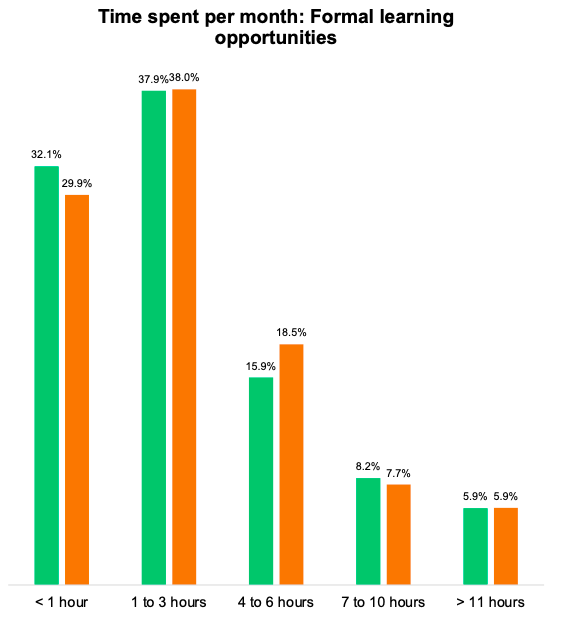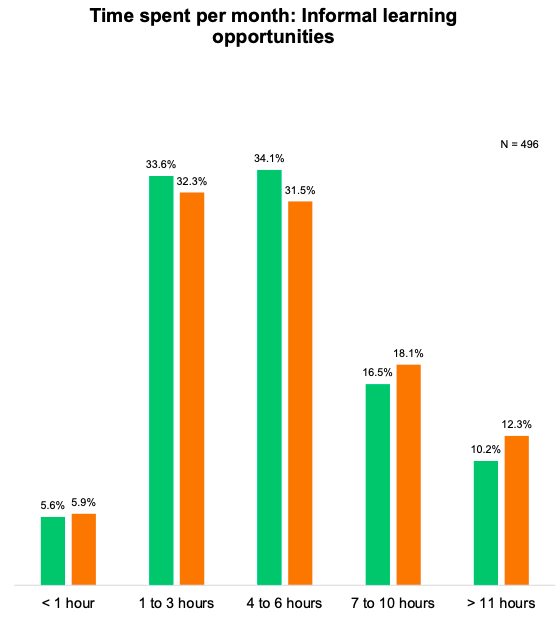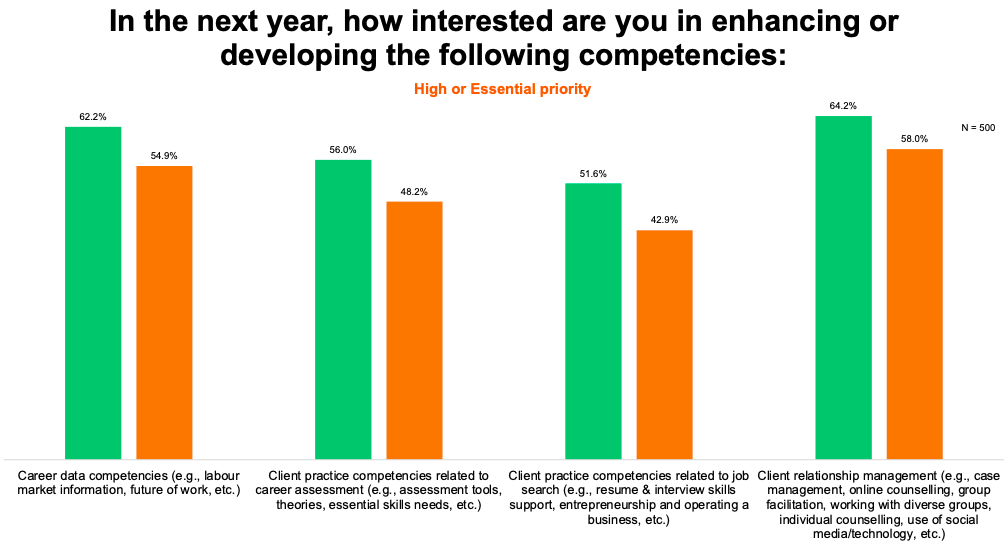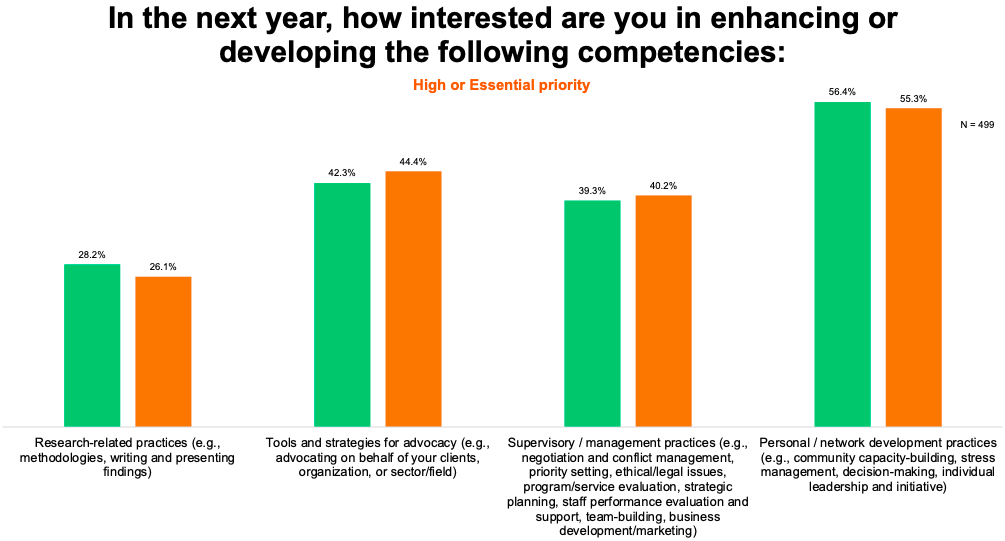If we have learned anything in the past seven months of living through a global pandemic, it is that change can be sudden, unexpected and completely out of our control. Predicting even the near future with accuracy has become more difficult, which, for career professionals who support individuals to achieve their career and employment goals, presents an urgent challenge. In recent months we have had to coach our clients to adapt to real-time and often dramatic changes in the job market, to inventory and leverage their transferrable skills, and to upskill and build the ability to job search, work, lead and learn virtually. As career professionals, all of us have had to make those very same sudden adjustments. Learning how to pivot has become a priority as a professional competency.
Pivot – n. a fixed point supporting something that turns or balances | v. a swift or strategic turn on the spot
A view from Ontario
While the services offered in the career development field are quite diverse, the Ontario results for the CERIC 2019 Survey of Career Service Professionals indicate that over 50% of respondents provide career/employment services one-on-one or with groups, and between 75-80% of the services they offer involve career counselling/coaching and employment advising/job coaching.
Services you are most likely to offer
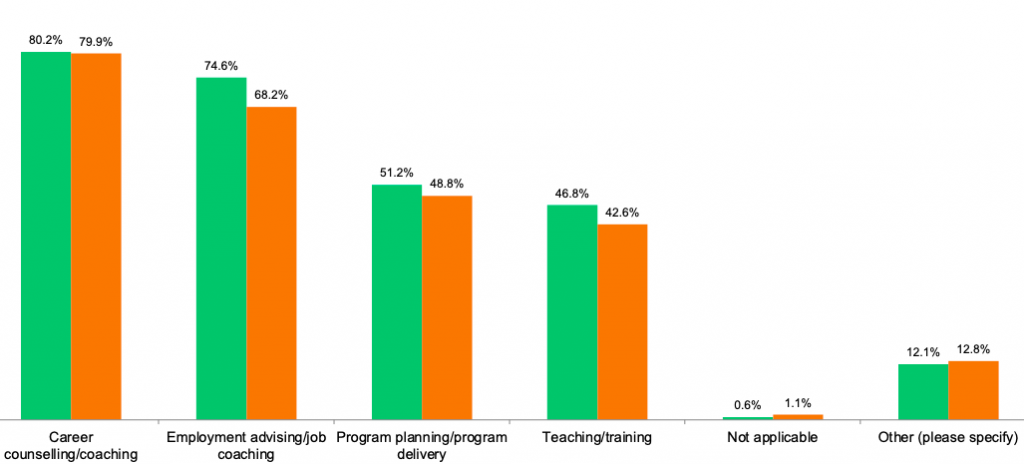
That makes sense. A labour force of almost eight million in Ontario is a sizeable population that may seek the support of career service professionals – a population that is also now dealing on some level with the seismic changes to the world of work. Even in the fall of 2019 when the CERIC survey was conducted, Adults in Career Transition was the top client group identified by Ontario survey respondents as a focus for their professional development. Reflecting on that figure now, it may be even more prevalent – it seems like it would not be an exaggeration to say career transition is something that is happening to almost all adults, and not by their own choice.
This article is part of a series exploring the regional results of CERIC’s 2019 Survey of Career Service Professionals amid our new reality. Read more:
Similarly, career professionals have had to pivot to fulfill our obligation to maintain our professional knowledge and skills: staying current on demand-side labour market trends, keeping up to date with a shift to all-virtual recruiting methodologies, new tools and technologies for virtual career service delivery and client management, not to mention coaching, counselling and self-care skills to support the mental health of our clients, and ourselves. But what often gets in the way of fulfilling our need for rapid upskilling and professional development? Quite simply, time and money.
Workshops, online courses, conferences and webinars, like those offered by CERIC, remain the most popular formal learning approaches for career professionals, in Ontario and nationally. However, about 70% of respondents said they spend fewer than three hours a month on formal learning
The Ontario survey results also show that our financial resources for development remain constrained. Just over 37% of respondents said no budget is provided by their employer (higher than the national response), and 50.8% of respondents said they would be willing to self-fund only $500 or less for their annual development.
All of this leaves a significant opportunity for informal, just-in-time learning.
Learning agility: The role of informal learning and a community of practice
When asked what competencies career service professionals are interested in developing in the next year, the top 3 responses in the Ontario survey results were Client relationship management (64.2%), Career data competencies (62.2%) and Personal / network development practices (56.4%).
These priorities certainly resonate with me as an independent career coach in Ontario with my own practice, but also as a Member and the current volunteer Chair of the Ontario Association of Career Management (OACM).
Our members have told us that topics of greatest interest for professional development include effective coaching techniques, future of work, career assessment tools, using social media/technology, client well-being and mental health. Furthermore, from a programming perspective, what is highly desired is network client referrals, networking events and networking introductions. The message: we need each other, and we are better together. We can collectively pivot on the strong pillar we form as a group.
We see a growing desire to build a strong community of practice to support each other through informal learning – crowd-sourcing challenges and sharing resources – especially during this time. Our Member Connections Calls have grown from monthly to bi-weekly, partly in response to our collective shift to working virtually with limited in-person opportunities to connect. They have also become a great source of sharing insights, trends, tools and learning from our respective client experiences (TikTok video introductions – yes, that’s a thing).
What also underscores the importance of building a strong community of practice is that 25.5% of the Ontario respondents to the CERIC survey are over the age of 55, and 12% of survey respondents say they will be retired or semi-retired in five years. The need to replenish the profession and bring new practitioners into the field of career services is growing. Informal learning and strong communities of practice are ways in which we can facilitate knowledge transfer and mentoring of the next generation of career professionals.




